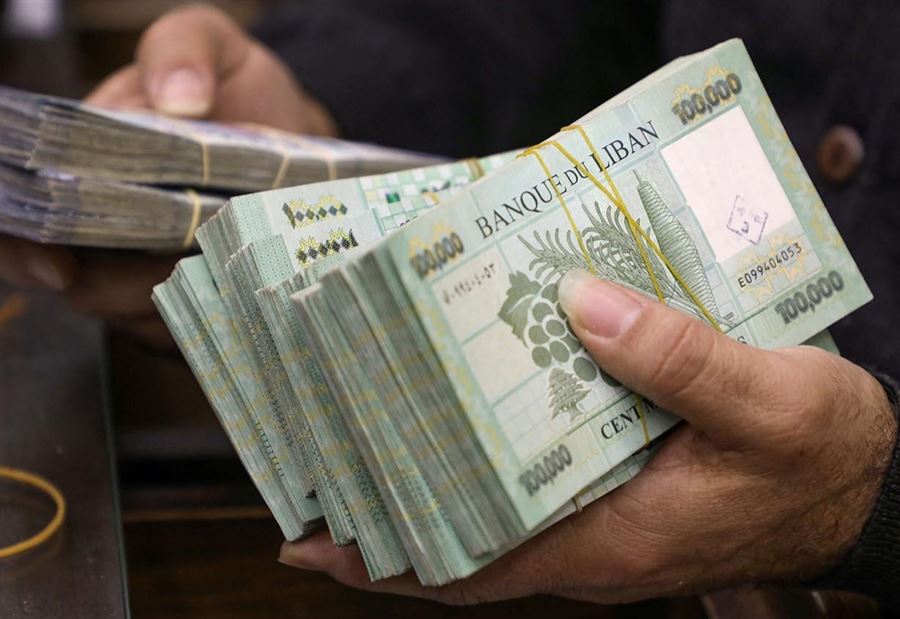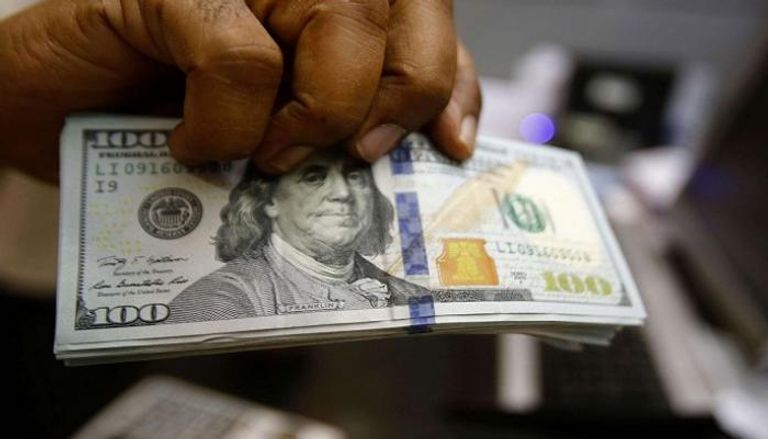لا يزال لبنان غارقاً في مستنقع أزمته الاقتصاديّة غير المسبوقة التي تتسم بانخفاض كبير في قيمة الليرة اللبنانية، وتضخّم متسارع، وفقدان الثقة في النظام المصرفي. وفي هذه الكارثة، يضرب النظام الاقتصاديّ يميناً ويساراً لينقذ نفسه بأيّ طريقة، ومنها اعتماده على الاقتصاد النقدي “الكاش”، الذي فرضه واقعاً على الكثير من اللبنانيّين. فأضحى يؤدّي النقد دوراً محورياً في المعاملات اليوميّة، خصوصاً وأنّ النظام المصرفي لا يزال هو الآخر مشلولاً إلى حدٍّ كبير، ويواجه مشاكل خطيرة في الملاءة والسيولة، نظراً لمستوى الخسائر التي بلغت 75 مليار دولار أميركي في النظام المالي المحلّي.
كما لا تزال الميزانيات العمومية للمصارف التجارية غير متوازنة إلى حَدّ فاضح، حيث اختفت بشكل أساسي التزامات بقيمة 90 مليار دولار أميركي من ودائع العملاء، وأصول بقيمة 84 مليار دولار أميركي من ودائع المصرف المركزي. وحتى العام 2023، تمكّنت البنوك التجارية من الحفاظ على ربحيّتها بفضل عمليات صرف العملات الأجنبية على منصة صيرفة، وبوضع النقد بالعملات الأجنبية في الأسواق، على خلفية ارتفاع أسعار الفائدة.
كما أدّى إغلاق منصة “صيرفة” إلى جعل نموذج أعمال المصارف، في ظلّ غياب توليد الائتمان، أكثر هشاشة بكثير، ويبدو أنّ بعض الودائع بالدولار الأميركي تُستَخدم لتمويل النفقات الجارية لبعض البنوك. وبالتوازي مع الصعوبات التي يواجهها القطاع المصرفي، نشهد تطوّراً سريعاً في القطاع المالي غير المصرفي الذي يُعاني من ضعف التنظيم، أو عدم تنظيمه على الإطلاق، ممّا يثير أخطار كبيرة تتعلّق بالامتثال. بالإضافة إلى ذلك، تستمر “دولرة” الاقتصاد، ونموّ القطاع غير الرسمي الذي يعمل بالكاش. فقد ارتفعت كتلة الاقتصاد النقدي في لبنان من 4,5 مليار دولار أميركيّ في العام 2020 إلى 9,9 مليار دولار أميركي في العام 2022، وهو ما يُمَثِّل نسبة اقتصاد نقديّ تبلغ 46% من الناتج المحلّي الإجماليّ
من ناحية، وفي ظلّ اقتصاد تتآكل فيه الثقة في المؤسسات الماليّة بشدة، توفّر المعاملات النقدية ملاذاً للسرّية. فاللبنانيّون القلقون من عدم استقرار المصارف، وتبخّر مدخراتهم، غالباً ما يُفضِّلون النقد للحفاظ على سرّيّتهم المصرفية، وحماية أصولهم.
علاوة على ذلك، بالتزامن مع إغلاق العديد من المصارف، والقيود الصارمة المفروضة على السحب النقدي، أصبح الكاش أداة لا غنى عنها عند المواطنين، خصوصاً لدى أولئك الذين لم يَعُد بإمكانهم الوصول إلى الخدمات المصرفية. كما يمكّن النقد الجميع، بغضّ النظر عن وضعهم المالي، من الاستمرار في المشاركة في الاقتصاد.
وفي بيئة يتقلّب فيها التضخّم بسرعة، يساعد استخدام النقد الأفراد على إدارة شؤونهم المالية بوجهٍ أفضل. كما يسمح الاحتفاظ بالكاش بإحكام السيطرة على الإنفاق، وتجنّب الغرق في الديون في وقت ترتفع فيه أسعار الفائدة بمعدّلات كبيرة.
بالإضافة إلى ما ذُكِر، فإنّ الرسوم المصرفية المرتفعة، يُزاد عليها القيود الصارمة التي تفرضها البنوك، دفعت العديد من اللبنانيّين إلى تفضيل المعاملات النقدية. ولا تحمل هذه الأخيرة أي رسوم إضافية. ويبقى الكاش الوسيلة الأكثر أماناً والأكثر سهولة لإجراء المعاملات اليومية، ممّا يضمن استمرارية النشاط الاقتصادي.
من ناحية أُخرى، فإنّ زيادة تداول النقد يُعرِّض الأفراد إلى خطر السرقة بشكل كبير. ففي بلد يواجه أزمات أمنية داخلية في بعض الأحيان، يتعرّض المواطنون والمواطنات إلى خطر فقدان مدّخراتهم، من دون إمكانية استردادها أو تعويضها.
كما يفرض الاستخدام المكثّف للنقد تكاليف كبيرة على الحكومة من أجل طباعة العملة وتوزيعها وإدارتها. كذلك، يغذّي الاقتصاد النقدي في لبنان الاقتصاد غير الرسمي، فلا يتمّ الإبلاغ عن العديد من المعاملات. وهذا يقلّل من الإيرادات الضريبية الحكومية، ممّا يزيد من تعقيد إدارة الأزمة الاقتصاديّة، ويَحدّ من قدرة الدولة على توفير الخدمات الأساسية.
ويؤدّي عدم إمكانية تتبع المعاملات النقديّة إلى تعقيد مكافحة الفساد، وتبييض الأموال وغيرها من الأنشطة غير المشروعة. ويعزّز هذا الغموض مناخ الإفلات من العقاب الذي يقوِّض فعالية الإصلاحات الاقتصادية والمالية.
كذلك، في ظلّ اقتصاد عالمي يزداد رقمنةً، يمكن أن يؤدّي الاعتماد الحصريّ على النقد إلى عزل اللبنانيّين عن الفرص الاقتصادية العالمية. كما أنّ الخدمات المالية الرقمية، والاستثمارات عبر الإنترنت، والتحويلات الدولية، تصبح غير متاحة، ممّا يفاقم العزلة الاقتصادية للبلاد.
هكذا، بات الاقتصاد النقدي سمة لا مفرّ منها في لبنان اليوم، حيث يُقدِّم مزايا ضرورية، ومساوئ ملحوظة في سياق الأزمة العميقة. وفي حين أنّ النقد يُمكِّن اللبنانيّين من البقاء على قيد الحياة في بيئة غير مستقرّة، إلّا أنّه يُديم بعض التحدّيات الاقتصادية والاجتماعية. لذلك، فإنّ تحقيق التوازن بين استخدام النقد، والإدماج التدريجي للحلول المالية الرقمية، يمكن أن يكون وسيلة واعدة لمساعدة لبنان على الخروج من أزمته الحالية مع بناء اقتصاد أكثر مرونة وشمولية. فهل يَعي القائمون على التخطيط المالي والاقتصادي في لبنان إلى هذه الحيثيات؟ أم أنّ السيولة المُدَولرة تغزّي طموحاتهم في جمع المزيد من الكاش الأخضر من دون المرور بالنظام المصرفي الرسمي؟ أم أنّهم سيتخبّطون إلى ما لا نهاية في وحول المستنقعات، فيغرقون ويُغرِقون معهم ما نجا من الاقتصاد اللبناني؟
المصدر: البروفيسور ندى الملاح البستاني
### The Quagmire of Lebanon's Cash Economy and the Struggles for Survival
Lebanon remains deeply mired in an unprecedented economic crisis marked by the sharp devaluation of the Lebanese pound, rampant inflation, and a complete loss of confidence in the banking system. In the midst of this disaster, the economic system is flailing, trying to save itself by any means necessary, including a heavy reliance on the cash economy, which has become a reality for many Lebanese citizens. Cash has become a central part of daily transactions, especially as the banking system remains largely paralyzed, struggling with severe issues of solvency and liquidity, as losses in the local financial system have reached a staggering $75 billion.
The balance sheets of commercial banks remain critically unbalanced, with $90 billion in customer deposits having essentially vanished, alongside $84 billion in assets from central bank deposits. By 2023, commercial banks were able to maintain profitability thanks to foreign currency transactions on the “Sayrafa” platform and by injecting foreign currency cash into the markets, driven by high-interest rates.
The closure of the Sayrafa platform, however, has left the banking sector's business model even more fragile, especially in the absence of credit generation. Some US dollar deposits appear to be used to fund ongoing expenses for certain banks. Meanwhile, the non-banking financial sector is rapidly developing, though it is poorly regulated, if at all, raising significant compliance risks. Simultaneously, the dollarization of the economy continues, and the informal cash-based sector is expanding. The size of the cash economy in Lebanon grew from $4.5 billion in 2020 to $9.9 billion in 2022, representing 46% of the gross domestic product.
In an economy where trust in financial institutions is severely eroded, cash transactions offer a sanctuary of privacy. Concerned about the instability of banks and the evaporation of their savings, many Lebanese prefer cash to maintain banking secrecy and protect their assets.
Moreover, with many banks closed and stringent withdrawal restrictions in place, cash has become indispensable for citizens, particularly those who no longer have access to banking services. Cash enables everyone, regardless of their financial status, to continue participating in the economy.
In an environment of rapidly fluctuating inflation, cash helps individuals manage their finances more effectively. Holding cash allows for better control over spending, preventing people from drowning in debt as interest rates soar.
Furthermore, high banking fees, coupled with stringent restrictions imposed by banks, have driven many Lebanese to prefer cash transactions, which do not carry additional fees. Cash remains the most secure and accessible means of conducting daily transactions, ensuring the continuity of economic activity.
On the flip side, the increased circulation of cash exposes individuals to a heightened risk of theft. In a country occasionally facing internal security crises, citizens are at risk of losing their savings, with little hope of recovery or compensation.
The intensive use of cash also imposes significant costs on the government for printing, distributing, and managing currency. Additionally, the cash economy fuels the informal economy, where many transactions go unreported, reducing government tax revenues, complicating the management of the economic crisis, and limiting the state's ability to provide essential services.
The untraceable nature of cash transactions complicates efforts to combat corruption, money laundering, and other illicit activities. This opacity fosters a climate of impunity, undermining the effectiveness of economic and financial reforms.
In an increasingly digital global economy, exclusive reliance on cash could isolate the Lebanese from global economic opportunities. Digital financial services, online investments, and international remittances become inaccessible, exacerbating the country's economic isolation.
Thus, the cash economy has become an unavoidable feature of Lebanon today, offering essential advantages but also notable drawbacks in the context of the deepening crisis. While cash allows Lebanese citizens to survive in an unstable environment, it also perpetuates some economic and social challenges. Therefore, balancing the use of cash with the gradual integration of digital financial solutions could be a promising way to help Lebanon emerge from its current crisis while building a more resilient and inclusive economy. Will Lebanon's financial and economic planners recognize these nuances? Or will the dollarized liquidity drive their ambitions to accumulate more green cash without passing through the formal banking system? Or will they continue to flounder indefinitely in the quagmire, dragging down with them what little remains of Lebanon's economy?
translated by economyscopes team
 سكوبات عالمية إقتصادية – EconomyScopes إجعل موقعنا خيارك ومصدرك الأنسب للأخبار الإقتصادية المحلية والعربية والعالمية على أنواعها بالإضافة الى نشر مجموعة لا بأس بها من فرص العمل في لبنان والشرق الأوسط والعالم
سكوبات عالمية إقتصادية – EconomyScopes إجعل موقعنا خيارك ومصدرك الأنسب للأخبار الإقتصادية المحلية والعربية والعالمية على أنواعها بالإضافة الى نشر مجموعة لا بأس بها من فرص العمل في لبنان والشرق الأوسط والعالم




